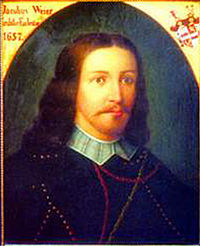| Revision as of 07:19, 17 November 2008 edit77.253.69.245 (talk) NPOV← Previous edit | Revision as of 11:21, 18 November 2008 edit undoOpole.pl (talk | contribs)Extended confirmed users626 edits linkNext edit → | ||
| Line 2: | Line 2: | ||
| ] | ] | ||
| '''Jakub Weiher''' (Weyherr) (first name also written as Jakob, surname also written as Weiherr, Waier, Weier, Weyher) (1609 – 1657), a member of the ] from ] was a Count of the ] and member of the ] ] (nobility). His coat of arms was ] (also known as Skarzyna). Weiher was the Castellan of ] and as ] (Marienburg) from 1643–1657, the ] of ], and the ] of ], ], ] and ]. He is remembered as a pious and tolerant ] and an experienced military leader. | '''Jakub Weiher''' (Weyherr) (first name also written as Jakob, surname also written as Weiherr, Waier, Weier, ]) (1609 – 1657), a member of the ] from ] was a Count of the ] and member of the ] ] (nobility). His coat of arms was ] (also known as Skarzyna). Weiher was the Castellan of ] and as ] (Marienburg) from 1643–1657, the ] of ], and the ] of ], ], ] and ]. He is remembered as a pious and tolerant ] and an experienced military leader. | ||
| ==Biography== | ==Biography== | ||
Revision as of 11:21, 18 November 2008

Jakub Weiher (Weyherr) (first name also written as Jakob, surname also written as Weiherr, Waier, Weier, Weyher) (1609 – 1657), a member of the Weyher noble family (von Weiher) from Germany was a Count of the Holy Roman Empire and member of the Polish-Lithuanian Commonwealth szlachta (nobility). His coat of arms was Weiher (also known as Skarzyna). Weiher was the Castellan of Puck and as Voivode of Malbork (Marienburg) from 1643–1657, the Castellan of Chmielno, and the Starost of Człuchowo, Kiszporek, Bychów and Brzechowo. He is remembered as a pious and tolerant magnate and an experienced military leader.
Biography

Weiher was one of eight sons of Johannes (Jan) Weiher (1580–1626) and Anna Szczawińska, and brother of Nicolaus Weiher (?–1647) and Ludwig Weyher (?–1656).
He was a member of a rich magnate family of Westphalia, some had moved to Pomerania where they are recorded since 1234. Martin Weiher was a Lutheran Bishop of Cammin. Jakub became courtier of prince Władysław IV Vasa. He studied first in a Jesuit College in Braunsberg, Prussia (now Braniewo Poland), then abroad at the University of Bologna. He was a Catholic and a supporter of the counter-reformation. Pursuing traditions of his family, as a youth he joined foreign military. In the years 1628-1632 he fought in the Thirty Years' War in the Holy Roman Empire in the armies of the Catholic League, commanding a cavalry unit under Albrecht von Wallenstein. At some point he visited Malta. For his valor he received the title count of the Holy Roman Empire (in 1636).
In 1632 he returned to Poland. In the royal army he fought in the Smolensk War (1633–1634), The Deluge, Russo-Polish War (1654–1667) and the Chmielnicki Uprising. During the Deluge, unlike many commanders in the North, he did not switch sides and defended Marienburg, now Malbork, for two months before capitulating. He was able to obtain from the Swedes a safe passage of his troops which retained their arms; he would soon join the Polish king in the south and would continue to fight the invaders.
For his services he was awarded by king and Sejm with several offices: Voivode of Malbork (1643–1657). Castellan of Chmielno. Starost of Człuchowo, Kiszporek, Bychów and Brzechowo. In his later years he ruled about 100 villages and five towns, and had an income of about 33,000 zloties. This made him one of the richest people in Pomerania and a notable magnate in contemporary Poland.
He supervised the construction of Władysławowo, a fledging port for the Polish-Lithuanian Commonwealth Navy. He founded the town of Weihersfrei, later Neustadt, now Wejherowo and in it, the Kalwaria Wejherowska (Calvary of Weihersfrei) chapel complex (fulfilling an oath he took when nearly died during the Smolensk War in Biała in 1634). Over the years he would found several other monasteries, churches, as well as secular settlements. Despite being an ardent Catholic, he has proven to be a tolerant ruler, and supported peaceful dealings with the Protestants.
He was married twice: once in 1636 to Anna Elżbieta (Ann Elisabeth von) Schaffgotsch and then in 1652 to Joanna Katarzyna Radziwiłł of the imperial Radziwill family. He had three daughters (two with Anna and one with Joanna). He was buried in St. Ann Church in Weihersfrei Wejherowo.
References
- Template:Pl icon Biography Jakub Wejher (1643-1657), a page sponsored by Wejherowo city council
- Template:Pl icon Another biography Jakub Wejher
- Template:Pl icon Jerzy Więckowiak, Jakub Wejher (1609-1657) – fundator i magnat pomorski, POMERANIA 1/1981